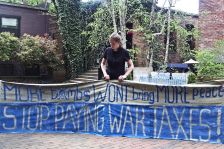An enduring image of Vietnam War resistance is men burning their draft cards. And, draft resistance played a big role in raising the profile of war tax resistance. Vietnam era draft resisters like Randy Kehler and Ed Hedemann followed up their refusal to fight with a refusal to pay for fighting, following the example of World War I and II draft and war tax resisters like Ammon Hennacy and Wally Nelson.
Ed Hedemann, who continues his work today with the National War Tax Resistance Coordinating Committee says, “They tried to draft me during the Vietnam War and I refused, then they wanted to draft my taxes and I refused, because I don’t see the difference between doing the killing myself or paying for someone else to kill.”
War tax resisters, whether or not they were subject to the draft, either maintained a low, untaxable income or simply didn’t pay the IRS for some or all of their tax bills. Many resisters refused to communicate with the IRS in any way, including filing tax returns. Reasons for practicing war tax resistance varied, but often included the desire to not cooperate with state violence as a matter of conscience.

As young men planned draft resistance, those not subject to the draft used war tax resistance to show solidarity. Beth Seberger told a 2011 conference of the National War Tax Resistance Coordinating Committee how she started resisting:
“When I told a friend I didn’t feel right about paying the IRS because of our country’s involvement in the Vietnam War, he said, ‘Then don’t! Haven’t you ever heard of Dorothy Day and the Catholic Worker? They don’t pay taxes.’ This was astounding news to me, and I was ready for it. I had two older brothers serving in the Air Force in the war, but I had been more influenced by Martin Luther King Jr. and his example of nonviolent resistance. I was seeing many young men my age struggling with their consciences over what to do about the draft. We women didn’t have that decision to face, but I felt paying taxes showed support and actually did give money to help carry on the war. The war resisters’ tax pie chart in that period showed 69 percent of discretionary spending going to pay for past, present, or future war expenditures. 69 percent! I only owed $18 and change for my 1969 taxes, but I sent a letter to IRS with my tax return and no check.”
War tax resisters during the Vietnam War era faced a wide range of consequences for their non-cooperation including levies on bank accounts and garnishment of wages, letters and visits from IRS agents, lost jobs, seized cars and houses, and in a few cases, jail time.
In 1966, Lyndon B. Johnson asked Congress to levy an additional tax on telephone bills to fund the military deployment in Vietnam. Activist Karl Meyer (still a war tax resister, and now a founder and member of the cooperative Catholic Worker community Nashville Greenlands) wrote the “Hang Up On War” pamphlet to encourage resistance to this telephone tax. By the end of the war, it is estimated that as many as 250,000 to 500,000 people had resisted the telephone tax.
The organization National War Tax Resistance was formed in 1969 as a response to the surge in interest in income and telephone tax resistance, and at its peak had 192 chapters. War tax resisters also sought support from organizations like Peacemakers and War Resisters League. Many resisters gave their taxes to alternative funds that redirected the money to community organizations more deserving of financial support.
During the length of the war, many prominent individuals took up resistance. For example, in 1968, the Writers and Editors War Tax Protest took out ads in three publications, listing writers and editors who pledged to refuse to pay the income tax and/or telephone tax. Signers included Howard Zinn, Allen Ginsberg, Grace Paley, Frances Fox Piven, Adrienne Rich, Helen and Scott Nearing, Kurt Vonnegut, and Philip and Daniel Berrigan.
Noam Chomsky was also a signer of this ad. In a 2011 interview, he said, “I organized tax resistance in 1965, with a friend. I kept at it for about ten years. I don’t see it as a principle, it’s a tactic. And I felt I had exhausted its potential as a tactic right about then, so I stopped.” Many, if not most war tax resisters seemed to agree with Chomsky. War tax resistance declined sharply after the war ended in 1975, and National War Tax Resistance also folded that year.
In 1982, the National War Tax Resistance Coordinating Committee was formed. Many new resisters during the 1980s took their stand as a result of U.S. support of Central American dictatorships in Guatemala, Nicaragua, and El Salvador. There have been surges of war tax resistance during each of the wars in which the U.S. has been involved (though records of how many people are resisters is hard to come by).
Those who have kept up their war tax resistance since the Vietnam War or who have started it since then tend to see it more as a principle than a tactic. If cooperating with the militaristic state during wartime is wrong, then it’s still wrong during what passes as peacetime when the military is readying itself for the next conflict.
War tax resistance during the Vietnam War was among the largest expressions of non-cooperation with a violent state, alongside GI resistance, draft resistance, and the many mass rallies and protests. Today, war tax resisters from a variety of backgrounds and perspectives continue refusing to pay taxes to support state violence.
Erica Weiland is the social media consultant for the National War Tax Resistance Coordinating Committee (NWTRCC), nwtrcc.org, although opinions expressed here are not official positions of the organization.
